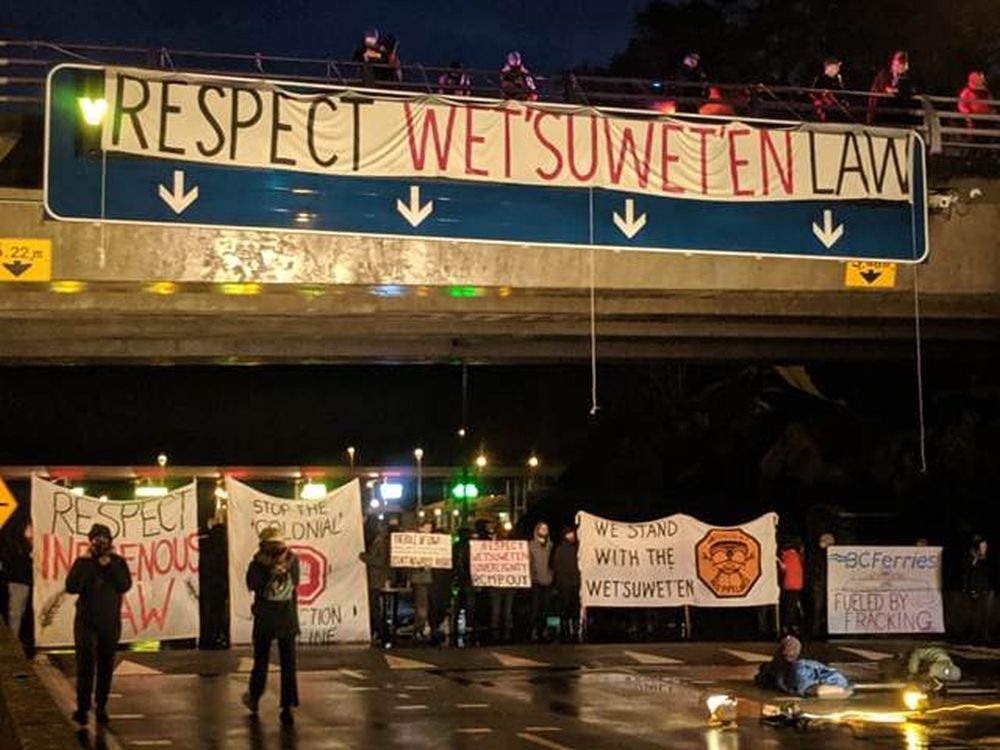Vaughn Palmer: Activism or pragmatism, the divide between Weaver and the Green caucus

Credit to Author: Gord Kurenoff| Date: Wed, 22 Jan 2020 01:26:24 +0000
VICTORIA — Andrew Weaver left the Green party caucus as scheduled on Monday and now sits as an independent member of the B.C. legislature.
Independence day for the former Green leader also provided an apt illustration of his divergence from other members of the party that he put on the provincial political map.
As it happened, morning ferry service on southern Vancouver Island was disrupted by protesters who staged a blockade in sympathy with Indigenous hereditary leaders fighting the Coastal GasLink natural gas pipeline in northern B.C.
Weaver, who represents Oak Bay in the provincial capital region, readily criticized the protest as a counterproductive inconvenience to his constituents and the travelling public.
“I’m probably the strongest and most outspoken person on natural gas and LNG in B.C., “ Weaver told host Al Ferraby on CFAX radio in Victoria. “But I just don’t think that is the way that you get your message across. Sadly, what I think you’re going to do is turn people off against the importance of actually reducing GHG emissions.”
Weaver’s successor as party leader on an interim basis, MLA Adam Olsen, also represents a constituency in capital region — indeed the one where the ferry terminal is located.
But far from condemning the disruption, Olsen pretty much supported it.
“It’s really important to acknowledge that a very important part of our democracy is peaceful demonstration,” he told host Adam Stirling on CFAX. “It becomes a really significant problem in our society when we start to close the space for peaceful demonstration, non-violent demonstration.”
So: Olsen the activist versus Weaver the pragmatist.
Weaver says the timing of his departure from the Green caucus was determined by a family health crisis that emerged at the turn of the year.
But he’d been speculating for some time about going non-partisan once he was no longer leader. He’d expressed reservations about the naiveté of Green party members and the activist leanings of the other two Green MLAs — Olsen, who took over as interim leader earlier this month, and Sonia Furstenau, who is expected to seek the top job on a permanent basis.
“The three of us bring different views to the table and we come up with different ideas,” Weaver told Mike Smyth of the Province recently in discussing his move away from the caucus. “The problem is my views are often less activist than other people’s views. … So I often have respectful disagreements with colleagues.”
Had Weaver not left caucus, there’s reason to think he would have exercised his formidable powers of persuasion to prevent the Greens from supporting the disruption of ferry services.
Had he not given up the leadership at the beginning of the year, he might have argued against accepting an invitation to visit the protest encampment in the path of the Coastal GasLink pipeline.
But Olsen did go to the encampment on Saturday, which provided an ironic backdrop to the sympathy protest at the ferry terminal in his riding Monday.
Olsen left no doubt that his own sympathies are with the hereditary leaders of the Wet’suwet’en people, fighting the construction of the pipeline in their traditional territory.
“It’s so beautiful, it’s so pristine out here,” said Olsen, who is a member of the Tsartlip First Nation. “Why would you want to destroy it?”
Olsen brushed aside concerns about meeting with a group that is defying a court injunction against any further efforts to block the pipeline.
But that could put the interim leader on a collision course with the Greens’ partner in power sharing, Premier John Horgan.
Horgan, during a tour of the region this week, declined an invitation to meet in person with the hereditary opponents of the pipeline.
The request came at the last minute when his schedule was already fixed, he told host Carolina de Ryk on CBC Daybreak North.
Besides: “They are currently rejecting a court injunction. It may not be appropriate for me to go anyway.”
His offer to talk by phone to one of the holdout leaders was rebuffed. So he left it with Indigenous Relations Minister Scott Fraser to continue a dialogue that has been going on for more than a year.
“Senior officials have been working with the Wet’suwet’en for 18 months now,” said the premier, sounding somewhat exasperated.
“I’m not going to drop everything I’m doing to come running when someone is saying they need to speak with me. I was available on the telephone. They didn’t want to talk to me.”
Horgan has maintained a tough line on the pipeline standoff, citing the court injunction as evidence that the matter is closed so far as the government is concerned.
He’s also underscored that the opponents are a minority among First Nations in the North, most of whose leaders support the project and many of whose people stand to benefit.
“The vast majority of Indigenous peoples across the north are supportive of the project,” the premier told reporters in Prince George Tuesday.
Though Olsen’s sympathies are with the opponents, he has so far hesitated to criticize Horgan directly. Asked point blank how he would resolve the stand off, he said it would be “totally inappropriate” to answer because he is not at the table.
But under the power-sharing agreement’s guarantee of access, the Green leaders will be meeting with the premier once Horgan gets back to the capital.
Given their differences on the pipeline standoff, it should be a stimulating discussion.
CLICK HERE to report a typo.
Is there more to this story? We’d like to hear from you about this or any other stories you think we should know about. Email vantips@postmedia.com